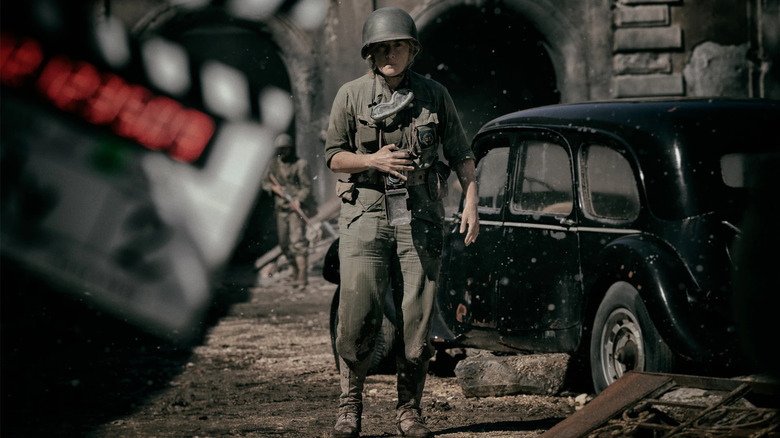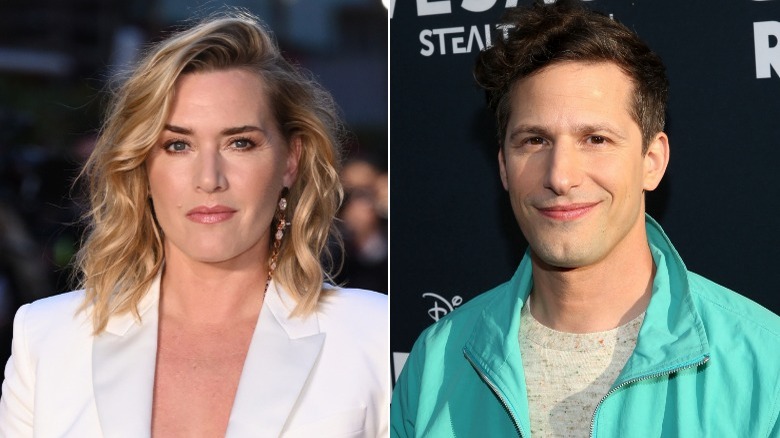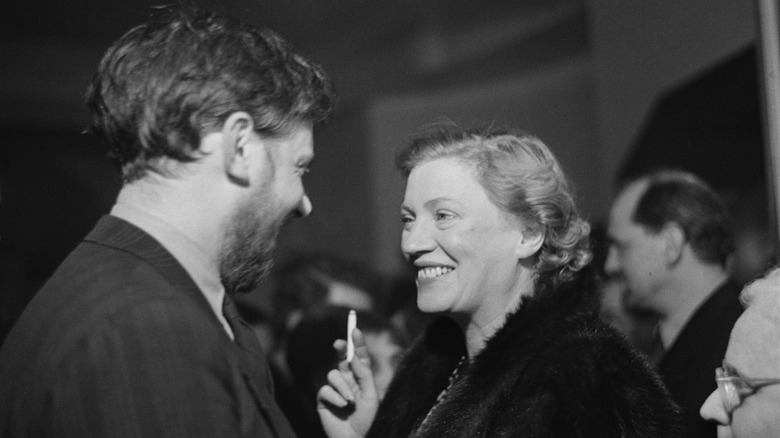Lee Review: A Muddled Biopic With None Of Its Subject's Boldness
- Strong performances from Kate Winslet and Andy Samberg
- Harrowing third act
- Over-reliance on framing device and voiceover narration
- Meandering plot doesn't do justice to its subject
"Lee," the story of model-turned-combat photographer Lee Miller, has long been a passion project for Kate Winslet, who plays the lead role. It's clear that she poured her heart and soul into the performance, reminding audiences exactly why she's one of the most magnetic actresses working in Hollywood today. But alas, "Lee" is also subject to the kind of muddled, unfocused storytelling that too often plague these sorts of passion projects. Although it features committed performances from its main cast, especially Andy Samberg in a rare dramatic role, it also drags frequently and is only partially redeemed by its harrowing third act.
Lee is a wanderer, a will-o'-the-wisp who is never satisfied to stay in one place for too long. After her career as a model peters out, she enjoys a glamorous avant-garde lifestyle, spending time in France with a troupe of artists and intellectuals before eventually settling down in London with her husband, art promoter Roland Penrose (Alexander Skarsgård). But with World War II approaching, their quiet life together seems destined for disruption, and Lee decides to put her photography skills to good use, finagling a job as a photojournalist at British Vogue.
Kate Winslet and Andy Samberg as an unlikely duo
Lee's keen and distinctly feminine eye captures a side of the war rarely seen, although she is initially only put to use on the home front — the British armed forces can hardly send a woman into a combat zone, after all. Luckily for Lee, the Americans have no such qualms, and she is eventually deployed — alongside Andy Samberg's David Scherman, a photojournalist for Life Magazine — into the heart of the war in Europe. She is initially met with resistance, but she worms her way into the action, managing to capture vital images from urban battles, the horrors of Dachau, and even the inner sanctum of Adolf Hitler's own bathroom. However, whether British Vogue has the courage to publish Lee's photos is another question altogether.
If the movie works at all, it's on the strength of Kate Winslet's scrappy, ornery lead performance. This kind of role is her bread and butter as an actress, and it's clear why this is a historical figure she was so drawn to. Her interpretation of Lee is prickly but deeply empathetic, especially when it comes to women in vulnerable positions, something she witnesses on a fairly regular basis as the Allied forces liberate France. Keeping up with her every step of the way, surprisingly, is Samberg as her colleague and closest friend. He has a calm, quiet presence — steady where Lee is impulsive — and the two play off each other remarkably well. If nothing else, this should prove that Samberg is someone to watch in the burgeoning field of comedians-turned-dramatic actors.
How a story gets lost in the weeds
The most frustrating thing about "Lee" is that there is a genuinely good film buried somewhere within it. As it is, though, the film fundamentally misunderstands what elements of its story are compelling and which are merely filler. As soon as Lee arrives in Europe, it's like an entirely different film, filled with energy and purpose. As Lee and Scherman document the horrors of the concentration camp and capture an iconic photo in Hitler's private bathroom, things become genuinely harrowing. But that's only the last 45 minutes or so, leaving the first two acts something of a slog to get through. It's hard to tell why certain parts of the film even exist — the framing story with an utterly wasted Josh O'Connor (Antony Penrose) having a heart-to-heart with a much older Lee about her wartime exploits, for example, serves almost no purpose. Or rather, it serves a purpose, but not enough of one to justify bloating the film's runtime. Furthermore, it paves the way for one of the greatest excesses of "Lee" — its decision to rely on voiceover narration from Kate Winslet, which feels like a crutch, as though the audience can't be trusted to follow the storyline without this support. It falls into the fatal trap of telling, not showing, and it hurts the film.
It's easy to see why this was a story Winslet was so eager to tell. Lee Miller was a fearless, complicated woman at a time when that wasn't a common or acceptable thing to be. Throughout the war, she doesn't get caught up in being a hero — she merely attempts to do her job as best she can, bringing a human side of the conflict to the readers of Vogue magazine. And she is never anything less than authentically herself. But the film doesn't live up to her visionary standards — it's unsure of itself, feeling the need to overexplain the narrative at times and take meandering byways that mute the emotional power of the straightest and simplest path forward. If it could take an ounce of Lee's boldness and use that as a guide, it would be perfect. As it is, "Lee" is disappointingly reserved.
"Lee" premiered at the Toronto International Film Festival. It does not yet have a U.S. release date.


